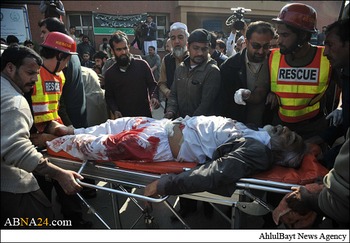Taliban suicide bombers attacked a Shia mosque in northwest Pakistan on Friday, police said, killing at least 19 people and wounding dozens more, with fighting still ongoing.
The attack comes two weeks after a suicide bombing at a Shia mosque in southern Pakistan killed 61 people, the deadliest sectarian incident to hit the country in nearly two years.
The Tehreek-e-Taliban Pakistan (TTP) claimed responsibility for the attack at the Imamia Masjid Imambargah in the posh Hayatabad area here where worshippers had gathered for the ‘Zuhr’ afternoon Friday prayers.
The Imambargah is situated close to several government buildings, including the local passport centre and the Federal Investigation Agency offices.
At least three explosions and gunfire was heard.
Police said four or five gunmen threw grenades before storming the Imamia mosque in Peshawar, the main city in Pakistan's restive northwest, around the time of the main Friday prayers.
Doctor Mumtaz Khan of the Hayatabad Medical Complex said that at least 19 people had been killed and 63 wounded.
Senior police official Mian Saeed confirmed the death toll, putting the number wounded at "more than 60".
TV footage showed people running away from the scene, some carrying injured on their shoulders, others limping, as police fired shots and checked people at a barrier.
Witness Muhammad Raza told AFP: "There was a huge explosion, I can see many injured lying in front of me."
An AFP reporter at the scene saw soldiers and police commandos arriving.
The mosque is close to several government buildings including the offices of the Federal Investigation Agency and passport agency.
Mushtaq Ghani, information minister for Khyber Pakhtunkhwa province, of which Peshawar is the capital, told Geo TV the attack was a response to the army's ongoing offensive against militants in the tribal areas along the Afghan border.
Since June last year the army has been waging a major campaign against strongholds of Taliban and other militants in the North Waziristan tribal area, which lies close to Peshawar.
The military has heralded the success of the operation, which it says has killed more than 2,000 militants, though the precise number and identity of those killed cannot be verified independently.
Pakistan has suffered a rising tide of sectarian violence in recent years, most of it perpetrated by hardline Sunni Muslim groups against minority Shia Muslims, who make up around a fifth of the population.
The suicide bombing at a mosque in southern Sindh province on January 30 was the deadliest sectarian attack in Pakistan since February 2013, when 89 were killed in a market bombing in the southwestern city of Quetta.
Anti-Shia attacks have been increasing in recent years in Karachi, Quetta, the northwestern area of Parachinar and the far-northeastern town of Gilgit.
The country has stepped up its fight against militants since a Taliban school massacre in Peshawar in December.
Heavily armed gunmen went from room to room at the army-run school gunning down more than 150 people, most of them children, in an attack that horrified the world.











/149

